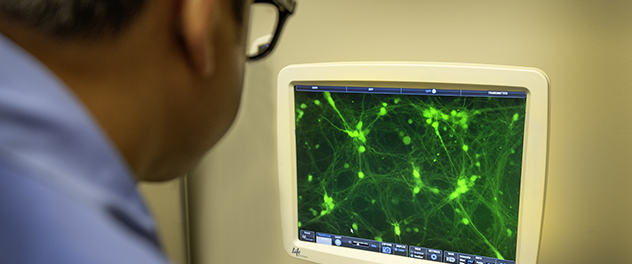Translating discoveries into therapeutics
 Translating discoveries into therapies
Translating discoveries into therapies
The Neurobiology of Parkinson's Disease and Related Disorders Lab aims to translate laboratory findings into transformative therapies using human induced pluripotent stem cell-derived neurons.
Despite recent advances in the symptomatic treatment of Parkinson's disease and related diseases, no intervention can halt or reverse the progression of this debilitating disease. The market for Parkinson's disease therapeutics is small compared with diseases with much higher incidence, such as cancer or heart disease. As a result, there is little incentive for significant Parkinson's disease drug discovery programs within the pharmaceutical industry. Together, these facts highlight the great need to de-risk novel therapeutic targets and strategies to treat Parkinson's disease and related diseases. Decreasing levels of alpha-synuclein protein is one of these novel strategies.
Research tools developed in the Neurobiology of Parkinson's Disease and Related Disorders Lab facilitate rapid screening of compound libraries for chemicals that target the oligomeric stage of fibrillization. That's where the rescue of the soluble monomeric forms of alpha-synuclein could potentially rescue cell death and slow disease progression and thus be potential candidate compounds for disease-modifying therapeutics. Dr. McLean's lab has performed high-throughput screens for compounds that directly inhibit oligomer formation and oligomer-induced toxicity using a sensitive, cell-based protein complementation assay to monitor oligomeric alpha-synuclein.
Additional therapeutic discovery projects include developing a novel gene therapy to reduce alpha-synuclein levels in the brain and discovering small molecules that can reduce protein levels.